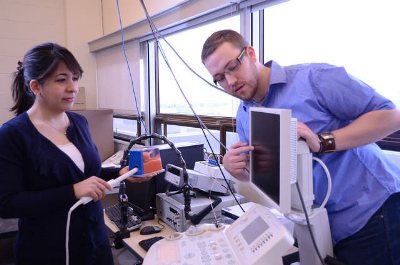From punch cards to the cloud, School of Computing marks 45 years
June 11, 2014
Share
By Mark Kerr, Senior Communications Officer
While technology has evolved dramatically since the School of Computing was founded in 1969, there has been one constant over those 45 years, according to Director Selim Akl.
 Queen’s School of Computing professor Parvin Mousavi and PhD candidate Andrew Dickinson evaluate a newly developed system for augmenting ultrasound-guided prostate biopsy.
Queen’s School of Computing professor Parvin Mousavi and PhD candidate Andrew Dickinson evaluate a newly developed system for augmenting ultrasound-guided prostate biopsy.“We have gone from punch cards during my graduate student days to CD ROMS and USB sticks. Now we are living in the cloud,” he says. “One thing that hasn’t changed, though, is the quality of our students. Our undergraduate and graduate students really are scholars and we’re proud of them.”
The School of Computing will celebrate 45 years of excellence in education, research and service by welcoming back alumni and opening the doors to its laboratories this weekend. Even though its golden anniversary is just a few short years away, the school felt it was important to mark the 45th anniversary.
“It’s a critical juncture for us, a time when we expect our enrolment at the undergraduate level to grow,” he says. “The anniversary is a chance to celebrate our accomplishments and the renewal taking place within the school.”
The School of Computing has grown to keep pace with the burgeoning field of computing science. When Dr. Akl arrived at Queen’s more than 30 years ago, there were six professors occupying half a floor in Goodwin Hall. Now, close to 30 professors work on four floors in Goodwin Hall and five different locations on campus.
I challenge anybody to find an aspect of society or life that is not touched by computers. That’s why the field is so exciting.
Selim Akl, Director, Queen's School of Computing
The School of Computing boasts the largest full-time graduate program at Queen’s, with an average of 150 full-time master’s and PhD students pursuing their degrees. “They are driving our research machine with their cutting edge work,” says Dr. Akl.
That research spans a broad range of topics, with many of the school’s 22 laboratories collaborating with departments across Queen’s, as well as other universities and industry partners. Dr. Akl says the nature of computing science encourages the school to work with many different partners.
“I challenge anybody to find an aspect of society or life that is not touched by computers. That’s why the field is so exciting,” he says. “It’s also exciting to do research in a field that’s moving so fast. Our faculty and graduate students are creating new things and they can see the result of their work. They get that instant gratification.”
With the field changing so quickly, Dr. Akl hesitates to predict how the School of Computing will look when it celebrates its 50th anniversary. However, he believes the school will do a lot more groundbreaking work in theoretical computer science, communications, cloud computing and human computer interaction. He also expects Queen’s researchers to remain leaders in the fields of software design, digital game development, knowledge discovery and computer-assisted health care.
There are several events planned for the anniversary including tours of various laboratories that are open to the general public. Visit the School of Computing website to learn more about all of the events.